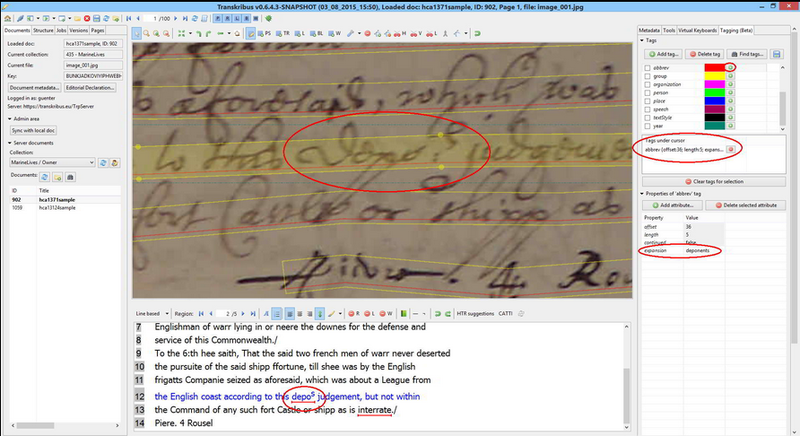Difference between revisions of "Tools: Collaboration with Transkribus"
| Line 1: | Line 1: | ||
| − | [[File:Transkribus HCA Example 19062016.png| | + | [[File:Transkribus HCA Example 19062016.png|800px|thumb|lright|Transkribus Handwriting Text Recognition (HTR) engine has been trained on mid-C17th High Court of Admiralty Court records]] |
'''MarineLives is structuring a project with the READ/Transkribus project team to explore key word spotting technology applied to English language legal records from the early and mid-C17th. The project is planned to start in April 2018 and to run through to October 2018.''' | '''MarineLives is structuring a project with the READ/Transkribus project team to explore key word spotting technology applied to English language legal records from the early and mid-C17th. The project is planned to start in April 2018 and to run through to October 2018.''' | ||
Revision as of 12:12, February 6, 2018
MarineLives is structuring a project with the READ/Transkribus project team to explore key word spotting technology applied to English language legal records from the early and mid-C17th. The project is planned to start in April 2018 and to run through to October 2018.
We are also exploring the use of Transkribus tools to scan signatures and markes at the bottom of High Court of Admiralty depositions as input to a proposed April 2018 Data Study Group with the Alan Turing Institute.
Contents
Key word spotting
Goals
- Build and test an interface for historical researchers to interact with Transkribus key word spotting technology.
- Searching for words in the image, not the text rendered transcription
Methodology
[ADD DATA]
Team
Colin Greenstreet (MarineLives)
Michael Bennett (Sheffield)
Opportunities to get involved
[ADD DATA]
Bibliography
Günter Mühlberger, Presentation: Transkribus - the status quo and future plans, Youtube video, pub. Jan 23. 2018[1]
Transkribus/VCG-DUTH-Word_Spotting_By_Example, Github, 2018[2]
Interactive Keywords Spotting Tool, showcased at European Researchers' Night, READ blog entry, Oct. 23, 2017[3]
K. Zagoris, I. Pratikakis and B. Gatos, "Segmentation-Based Historical Hand-written Word Spotting Using Document-Specific Local Features," 2014 14th In-ternational Conference on Frontiers in Handwriting Recognition, Heraklion, 2014, pp. 9-14.
K. Zagoris, I. Pratikakis, and B. Gatos, “A framework for efficient transcription of historical documents using keyword spotting,” in Historical Document Imaging and Processing (HIP’15), 3rd International Workshop on, August 2015, pp. 9–14.
K. Zagoris, I. Pratikakis, B. Gatos. 2017 Unsupervised Word Spotting in Histori-cal Handwritten Document Images using Document-oriented Local Features. Transactions on Image Processing. Under Review.
Signature/Marke recognition
Goals
- Build and test an interface for historical researchers to interact with Transkribus key word spotting technology.
Methodology
[ADD DATA]
Team
Colin Greenstreet (MarineLives)
Opportunities to get involved
[ADD DATA]
Bibliography
[ADD DATA]
Transkribus background
- ↑ Günter Mühlberger, Presentation: Transkribus - the status quo and future plans, Youtube video, pub. Jan 23. 2018, accessed 06/02/2018
- ↑ Transkribus/VCG-DUTH-Word_Spoting_By_Example, Github, 2018, accessed 06/02/2018
- ↑ Interactive Keywords Spotting Tool, showcased at European Researchers' Night, READ blog entry, Oct. 23, 2017, accessed 06/02/2018
